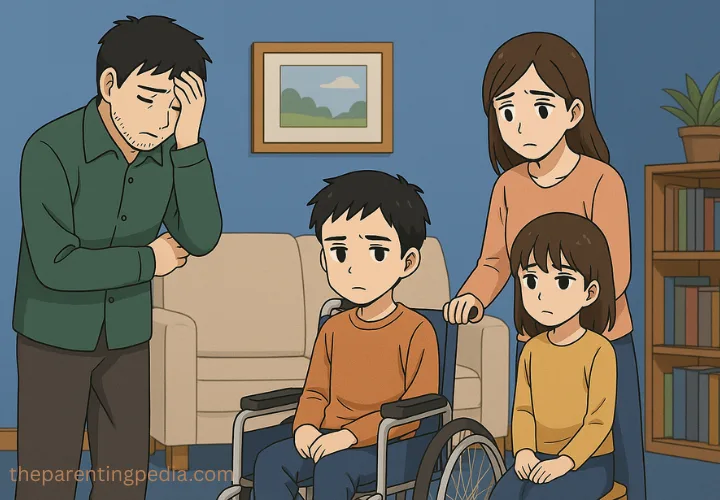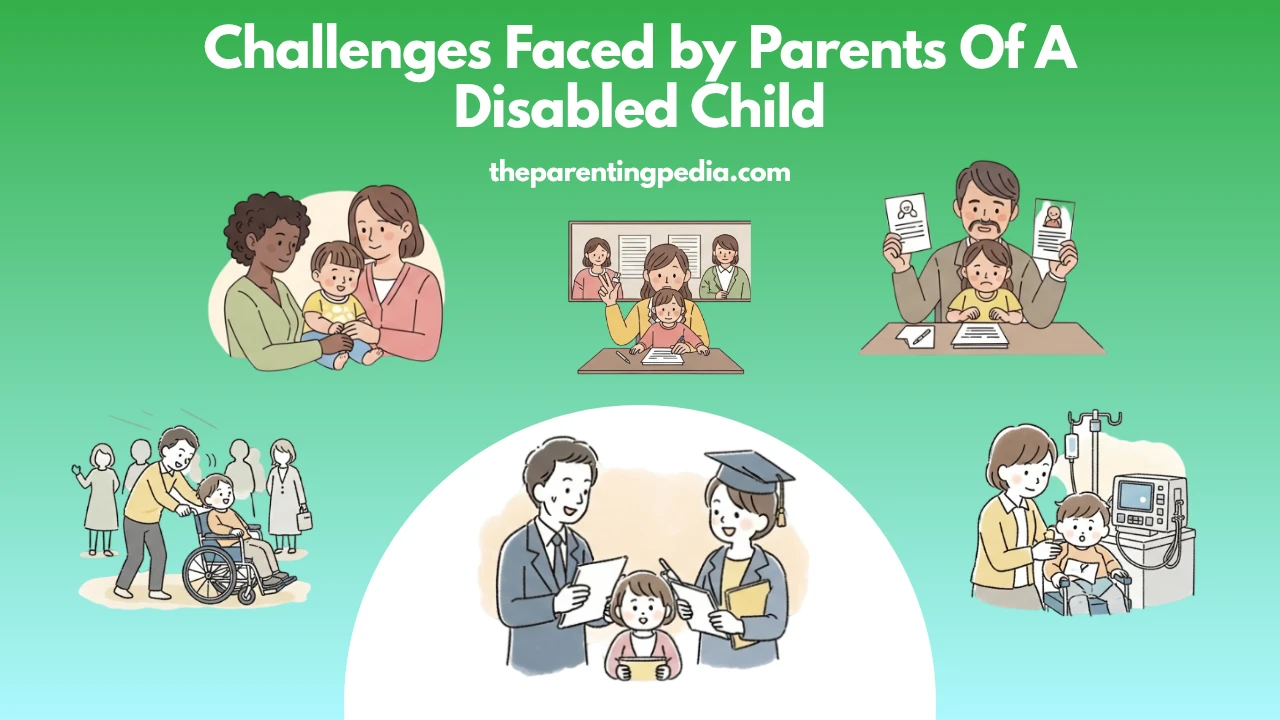Raising a child is always a big responsibility but when a child has a disability, parenting can become even more challenging. Disabilities can include physical, intellectual, developmental or sensory conditions that affect how a child moves, learns, communicates or interacts with others. Every disabled child is different and so is every family’s journey. However, many parents face similar struggles. Let’s explore challenges faced by arents of disabled child in detail and discuss practical ways in which parents can find support and build their strength.
Obstacles Parents Of Disabled Children Face And Their Solutions

1. Emotional Stress and Mental Health Strain
When parents find out their child has a disability, they often feel a wide range of emotions like sadness, guilt, anger, confusion or fear. They might ask themselves, “Why did this happen?” or worry about what the future will hold. As they face daily caregiving tasks, many parents feel overwhelmed or emotionally drained. They may struggle with depression or anxiety, especially if they don’t have a good support system. Seeing their child experience pain, frustration, or social rejection can also break their hearts.
Steps That Can Help:
- Parents should consider talking to a counselor or psychologist to share their feelings and get professional support.
- Joining a support group with other parents of disabled children can provide understanding, comfort and practical advice for parents.
- Practicing self-care activities such as exercising, meditating, or enjoying hobbies can also help parents manage their stress.
2. Financial Challenges
Raising a child with a disability can cost much more than raising a normal developing child. Parents may need to pay for special therapies, medical care, assistive devices, transportation or educational support. Some parents need to leave their jobs or reduce their work hours to care for their child which lowers family income. All of these expenses can create financial stress and make it hard to plan for the future.
Steps That Can Help:
- Parents should research government schemes, non-governmental organizations or insurance policies that can help cover medical, educational or therapy costs.
- They can talk to a social worker or financial advisor about programs and benefits they may be eligible for.
- Creating a realistic family budget and savings plan can also make it easier to manage expenses.
3. Physical Demands
Depending on the child’s disability, parents might need to help with feeding, bathing, lifting or moving their disabled child. Over time, these tasks can cause parents to feel physically exhausted or even lead to injuries like back pain. Caring for a child who needs constant supervision can also leave parents with little time for rest or personal activities leading to exhaustion in them.
Steps That Can Help:
- Parents should learn safe techniques for lifting and moving their child to avoid injuries.
- They can ask trusted family members or friends for help with daily tasks to ease their physical workload.
- Exploring care services where trained caregivers look after the disabled child for a few hours or days can give parents a much-needed break to rest and recharge.
4. Educational Challenges
Many parents of disabled children struggle to find the right school or educational program. Some schools lack resources or trained teachers. Others may refuse admission or fail to make necessary accommodations. Even in inclusive schools, parents may need to fight for their child’s rights or spend time educating teachers about their child’s needs.
Steps That Can Help:
- Parents should learn about laws that protect the right to education for children with disabilities, so they can advocate confidently for their disabled child.
- They can work with special educators to create an Individualized Education Plan tailored to their child’s needs.
- Maintaining open and regular communication with teachers and school staff can help ensure their disabled child receives proper support.
5. Social Stigma and Isolation
Unfortunately, many societies still hold negative attitudes towards child disabilities. Parents may hear hurtful comments or experience judgment from relatives, neighbors, or strangers. Some people might avoid interacting with their child or treat them unfairly. This stigma can lead parents to withdraw from social activities feeling isolated and alone. It can also affect siblings who may feel embarrassed or left out.
Steps That Can Help:
- Parents should educate friends, family, and community members about their child’s abilities as well as challenges to promote understanding.
- They can connect with other families in similar situations through support groups which can reduce feelings of isolation.
- Advocating for awareness and involvement in schools, communities and workplaces can help reduce stigma over time.
Also Read: How Parental Stress Affects Children’s Well-Being
6. Relationship Strain
Caring for a disabled child can put stress on a marriage or relationship. Parents might disagree on treatment decisions or feel resentful about uneven caregiving responsibilities. They may also struggle to find time for each other leading to emotional distance. Brothers and sisters of the child may also feel neglected or jealous if they think their needs come second.
Steps That Can Help:
- Parents should schedule regular times to talk honestly with each other about their feelings and challenges.
- If relationship problems persist, seeking couples or family therapy can help improve communication and understanding.
- Making special one-on-one time for siblings can remind them they are loved and valued by parents.
7. Balancing Hope and Acceptance
Parents naturally hope their disabled child will improve or overcome challenges. But when progress is slow or setbacks happen, they may feel disappointed or hopeless. Finding a healthy balance between encouraging the child and accepting their limits is emotionally tough but necessary for both the child’s and parents well-being.
Steps That Can Help:
- Parents should celebrate every small achievement their child makes, no matter how minor it may seem.
- Setting realistic and flexible goals can help parents stay positive while adjusting to their child’s pace of development.
- Focusing on their disabled child’s strengths and unique abilities instead of only their limitations can encourage a more positive outlook.

8. Planning for the Future
Many parents worry about what will happen to their child when they grow up. Will they be independent? Will they find work or relationships? What will happen when the parents are no longer around? These questions can create constant anxiety in parents especially if there are no trusted family members to step in.
Steps That Can Help:
- Parents should learn about vocational training, sheltered workshops or supported employment programs that can help their child build skills for adulthood.
- Exploring legal options like setting up a guardianship or a special needs trust can provide security for their child’s future.
- Teaching important life skills such as self-care, communication and money management as early as possible can also prepare their child for greater independence.
9. Advocacy and Fighting for Rights
Parents often have to become advocates fighting for their child’s right to education, healthcare or fair treatment. This can mean attending meetings, writing letters or even going to court. Advocacy takes time, energy and courage but can lead to better opportunities for the disabled child.
Steps That Can Help:
- Parents should take time to learn about the disability rights laws in their country so they can speak up confidently.
- Joining parent advocacy groups can provide support and resources for effective advocacy.
- Sharing their stories with others can also raise awareness and inspire positive changes in schools, communities and government policies.

Conclusion
Parenting a disabled child can be one of life’s most difficult yet meaningful journeys. It demands endless love, patience, strength and determination. The challenges are real like emotional stress, financial strain, social stigma and constant worries about the future. However, by taking support from others, learning about rights and taking care of themselves, parents can help their child live a full and happy life. With the right help, understanding and a caring community, challenges of disabled child can be transformed into opportunities for growth, love and hope.
FAQ
What are the challenges faced by parents of disabled children?
Parents of disabled children face emotional stress, financial strain, physical exhaustion, social stigma, educational barriers, relationship tensions and constant worries about their child’s future often feeling isolated and overwhelmed.
How do parents cope with children with disabilities?
Parents cope by seeking professional help, joining support groups, practicing self-care, advocating for their child’s rights, building a strong support network, educating themselves and celebrating small victories to stay positive.
